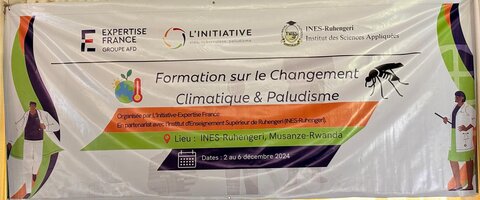The OPT-SMC team presents at Expertise France conference

The OPT-SMC team, represented by Prof. Jean-Louis Ndiaye (University of Thiés), Dr. Corinne Merle (WHO-TDR), and Dr. André-Marie Tchouatieu (MMV), served as trainers and part of the scientific committee of a training course organised by Expertise France on climate change and malaria.
The relationship between malaria and climate is intricate and multifaceted, requiring a deep understanding from national malaria program managers who regularly face challenges in combating this disease. To address this, it is essential to bring together experts in malaria epidemiology, entomology, and climatology to explore these interactions and establish collaborative frameworks aimed at reversing malaria trends amidst the realities of climate change.
To this end, Expertise France, the French public agency specializing in international technical cooperation, organized a week-long training program on malaria and climate change. This initiative, held in collaboration with the Institute of Applied Sciences INES-Ruhengeri in Rwanda, was conducted under the auspices of L'Initiative—a mechanism working closely with the Global Fund to accelerate the fight against pandemics and improve health access in partner countries. The training gathered participants from 19 French-speaking African nations, aiming to raise awareness among National Malaria Control Programs (NMCPs) about the interplay between malaria and climate change while equipping them with actionable strategies for implementation in their respective contexts.
The primary goals of the training were:
- To enhance collaboration between malaria programs and meteorological services.
- To promote the integration of environmental indicators into DHIS2, the widely used health information system.
- To encourage the adoption of tailored modelling approaches to better respond to shifting malaria patterns driven by climate change.
Participants began with a refresher session on interpreting surveillance data and an overview of the latest scientific findings on how climate change, directly and indirectly, impacts malaria. Country representatives shared testimonies about observed trends and implemented solutions, fostering a rich exchange of experiences, initiatives, and best practices.
A core focus of the training was introducing participants to the fundamentals of modelling and its relevance in malaria surveillance. Through practical exercises, they explored how climate forecasts could predict and shape future malaria trends. The program brought together diverse expertise in surveillance, entomology, meteorology, modelling, research methodology, and multisectoral approaches, offering participants a comprehensive, multidisciplinary perspective on the complexities of malaria and climate change.
Rwanda as the Ideal Host
Rwanda was selected as the venue for its exemplary progress in malaria control, now advancing towards pre-elimination, despite being under threat from climate change. The country’s malaria program has established sentinel sites combining epidemiological, entomological, and meteorological surveillance. Participants visited one of these sites in Rwanza to gain insights from Rwanda's innovative approach.
Organizing and Delivering the Training
In addition to members of the OPT-SMC committee from MMV, TDR amd University of Thiès, other members of the scientific committee were from:
- WHO Global Malaria Programme
- Rwanda Biomedical Center (RBC)
- Quality & Equity Healthcare Rwanda
- CS4ME (the international civil society platform for malaria elimination)
This committee played a pivotal role in shaping the program, selecting speakers, and facilitating engagement with country-level malaria programs.
Other trainers came from an array of renowned institutions, including:
- International Centre for Theoretical Physics (ICTP), Trieste, Italy
- Swiss Tropical and Public Health Institute (Swiss TPH)
- Ministry of Health, Cambodia
- French National Research Institute for Sustainable Development (IRD)
- Cheikh Anta Diop University, Dakar, Senegal
- CS4ME
- Pasteur Institute of Madagascar
In conclusion, this training underscored the urgent need for multidisciplinary collaboration to address the intersection of malaria and climate change. By equipping NMCPs with knowledge and tools, it laid the groundwork for innovative and adaptive strategies to mitigate the impacts of climate change on malaria trends, reinforcing the global fight against this persistent disease.